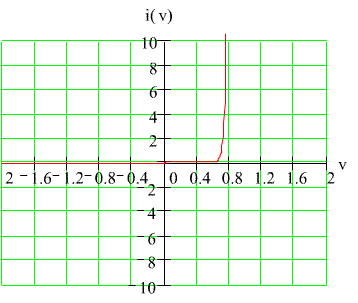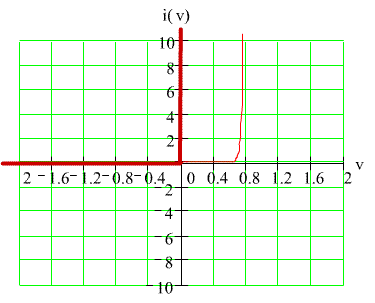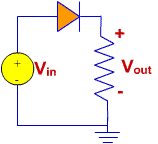| Introduction to Diodes |
Diodes
Diodes are different and useful electrical components. Diodes are
used in many applications like the following.
-
Converting AC power from
the 60Hz line into DC power for radios, televisions, telephone answering
machines, computers, and many other electronic devices.
-
Converting radio frequency
signals into audible signals in radios.
Here
are the goals for this lesson unit.
Diode
Properties
Diodes have the following characteristics.
-
Diodes are two terminal
devices like resistors and capacitors. They don't have many terminals
like transistors or integrated circuits.
-
In diodes current is directly
related to voltage, like in a resistor. They're not like capacitors
where current is related to the time derivative of voltage or inductors
where the derivative of current is related to voltage.
-
In diodes the current
is not linearly related to voltage, like in a resistor.
-
Diodes only consume power.
They don't produce power like a battery. They are said to be passive devices.
-
Diodes are nonlinear,
two
terminal,
passive
electrical devices.
In
general, diodes tend to permit current flow in one direction, but tend
to inhibit current flow in the opposite direction. The graph below
shows how current can depend upon voltage for a diode.

Note the following.
-
When the voltage across
the diode is positive, a lot of current can flow once the voltage becomes
large enough.
-
When the voltage across
the diode is negative, virtually no current flows.
The
circuit symbol for a diode is designed to remind you that current flows
easily through a diode in one direction. The circuit symbol for a
diode is shown below together with common conventions for current through
the diode and voltage across the diode.

Thinking
About Diodes
Diodes are a little schizophrenic.
-
Sometimes they let a lot
of current flow through them,
-
Sometimes they permit
hardly any current flow through them.
This schizophrenic behavior gives us a way to
think through what happens in many diode circuits.
We're going to adopt a simplified model for the diode. Instead of
the actual voltage-current curve for the diode shown in the thin, lighter
red, curved line below, we're going to imagine that the diode has the voltage-current
curve shown in the thicker, dark red lines below.

The approximate voltage-current curve gives us one way to analyze circuits
that contain diodes, and to account for their schizophrenic behavior.
-
When current is flowing,
this approximate model predicts no voltage across the diode. In this
situation, we say that the diode is ON.
-
When the voltage across
the diode is negative, this approximate model predicts no current flowing
through the diode. In this situation, we say that the diode is OFF.
Now,
consider this kind of simplified model for the diode.
-
When the diode is
ON,
it has no voltage across it so it acts like a short circuit! When
the diode is ON, the current through the diode is positive, and the voltage
across the diode is zero.
-
When the diode is
OFF,
current is zero, so it acts like an open circuit! When the diode
is OFF, the voltage across the diode is negative, and the current through
the diode is zero.
So,
this idealized model for the diode is sometimes an open circuit, and somtimes
a closed circuit - truly schizophrenic! This model for the diode
is often referred to as the ideal diode
model.
Using
Diodes
Now, let's examine a simple diode circuit. Remember what we know
about ideal diodes. We will assume that the diode is ideal for the
sake of argument.
-
When the diode is
ON,
it has no voltage across it so it acts like a short circuit!
-
When the diode is
OFF,
current is zero, so it acts like an open circuit!
Now,
let's look at a simple diode circuit.

It's just a diode and a resistor operating
on an input voltage. We would like to determine how the output voltage
depends upon the input voltage. We know something about the circuit.
-
When the diode is
ON,
the voltage across it is zero because it acts like a short circuit.
-
When the diode is
OFF,
the current through it is zero because it acts like an open circuit.
-
We have one or the other
of these two situations. It can't be both ways, and it has to be
one or the other. That gives us a strategy that will let use figure
out what happens in circuits with diodes.
|

